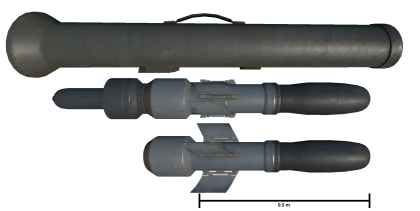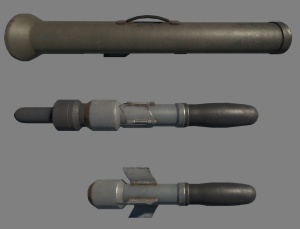Difference between revisions of "MILAN"
(Added text about the history of the MILAN missile system and its variants) (Tag: Visual edit) |
m (fixed epic spelling error) (Tag: Visual edit) |
||
| (2 intermediate revisions by 2 users not shown) | |||
| Line 4: | Line 4: | ||
| usage-1 = the improved version | | usage-1 = the improved version | ||
| link-1 = MILAN 2 | | link-1 = MILAN 2 | ||
| − | | usage-2 = | + | | usage-2 = other uses |
| − | | link-2 = Milan | + | | link-2 = Milan (Disambiguation) |
}} | }} | ||
| − | |||
== Description == | == Description == | ||
<!-- ''Write an introduction to the article in 2-3 small paragraphs. Briefly tell us about the history of the development and combat using the weaponry and also about its features. Compile a list of air, ground, or naval vehicles that feature this weapon system in the game.'' --> | <!-- ''Write an introduction to the article in 2-3 small paragraphs. Briefly tell us about the history of the development and combat using the weaponry and also about its features. Compile a list of air, ground, or naval vehicles that feature this weapon system in the game.'' --> | ||
| − | [[File:WeaponImage MILAN.png|thumb|left|420px|The MILAN missile (the launch tube, missile with | + | [[File:WeaponImage MILAN.png|thumb|left|420px|The MILAN missile (the launch tube, missile with first stage motor, and deployed missile are shown; scale is approximate)]] |
{{Break}} | {{Break}} | ||
The '''{{PAGENAME}}''' is a Franco-German SACLOS [[Anti-tank guided missiles|anti-tank guided missile]]. It was introduced in [[Update 1.81 "The Valkyries"]]. | The '''{{PAGENAME}}''' is a Franco-German SACLOS [[Anti-tank guided missiles|anti-tank guided missile]]. It was introduced in [[Update 1.81 "The Valkyries"]]. | ||
| Line 110: | Line 109: | ||
== History == | == History == | ||
| − | The MILAN ATGM was created as a result of the "Euromissile" Franco-West German joint missile | + | <!--''Examine the history of the creation and combat usage of the weapon in more detail than in the introduction. If the historical reference turns out to be too long, take it to a separate article, taking a link to the article about the weapon and adding a block "/History" (example: <nowiki>https://wiki.warthunder.com/(Weapon-name)/History</nowiki>) and add a link to it here using the <code>main</code> template. Be sure to reference text and sources by using <code><nowiki><ref></ref></nowiki></code>, as well as adding them at the end of the article with <code><nowiki><references /></nowiki></code>.''--> |
| + | The MILAN ATGM was created as a result of the "Euromissile" Franco-West German joint missile development program in the 1960s. The missile system quickly became the standard anti-tank weapon of many NATO forces, and found widespread use in most of the armies of the Alliance. | ||
The MILAN system, which consists of two main components, the launcher and the missile, employs a semi-automatic command to line of sight (SACLOS) command guidance system, which keeps the missile in the center of the operators crosshairs, by using GPS technology and, depending on the model, the missile is tracked using either a tail-mounted infrared lamp or an electronic-flash lamp. The missile is not affected by radio jamming or flares because it is wire-guided. However, drawbacks include short range, issues with overland powerlines, and a vulnerability to infrared jammers, which can prevent the missile's IR tail light from being tracked correctly. | The MILAN system, which consists of two main components, the launcher and the missile, employs a semi-automatic command to line of sight (SACLOS) command guidance system, which keeps the missile in the center of the operators crosshairs, by using GPS technology and, depending on the model, the missile is tracked using either a tail-mounted infrared lamp or an electronic-flash lamp. The missile is not affected by radio jamming or flares because it is wire-guided. However, drawbacks include short range, issues with overland powerlines, and a vulnerability to infrared jammers, which can prevent the missile's IR tail light from being tracked correctly. | ||
| Line 122: | Line 122: | ||
* MILAN ER (calibre 150 mm, tandem shaped charge warhead with increased penetration and maximum 3 km range, developed in 2006) | * MILAN ER (calibre 150 mm, tandem shaped charge warhead with increased penetration and maximum 3 km range, developed in 2006) | ||
| − | The later variants of the MILAN system make use of tandem-charge HEAT warheads in order to keep up with | + | The later variants of the MILAN system make use of tandem-charge HEAT warheads in order to keep up with developments in Soviet armor systems (ERA), which proved very effective against single shaped-charge warhead ATGMs. |
== Media == | == Media == | ||
| − | ''Excellent additions to the article would be video guides, screenshots from the game, and photos.'' | + | <!--''Excellent additions to the article would be video guides, screenshots from the game, and photos.''--> |
| + | [[File:Milan.jpg|right|thumb]] | ||
== See also == | == See also == | ||
Latest revision as of 11:03, 3 August 2023
| This page is about the Franco-German ATGM MILAN. For the improved version, see MILAN 2. For other uses, see Milan (Disambiguation). |
Contents
Description
The MILAN is a Franco-German SACLOS anti-tank guided missile. It was introduced in Update 1.81 "The Valkyries".
The MILAN is an anti-tank guided missile developed jointly by France and Germany, with a single shaped-charge warhead. MILAN means "Missile d'Infanterie Léger ANtichar" (light anti-tank infantry missile). It is also the name for a family of a bird of prey (Kites) in French.
Vehicles equipped with this weapon
General info
| Missile characteristics | |
|---|---|
| Calibre | 103 mm |
| Projectile Mass | 6.7 kg |
| max. speed | 200 m/s |
| Guidance system type | Semi-automatic |
| Missile guidance time | 15 secs |
| Firing range | 2.00 km |
| Explosive Mass | 1.83 kg TNTe |
| Fuze Sensitivity | 0.1 mm |
| Fuze delay | 0.05 m |
Effective damage
| 0° | 30° | 60° | |
|---|---|---|---|
| 10 m | 530 mm | 459 mm | 265 mm |
| 100 m | 530 mm | 459 mm | 265 mm |
| 500 m | 530 mm | 459 mm | 265 mm |
| 1,000 m | 530 mm | 459 mm | 265 mm |
| 1,500 m | 530 mm | 459 mm | 265 mm |
| 2,000 m | 530 mm | 459 mm | 265 mm |
Comparison with analogues
Give a comparative description of missiles that have firepower equal to this weapon.
Usage in battles
Describe situations when you would utilise this missile in-game (vehicle, pillbox, base, etc)
Pros and cons
Summarise and briefly evaluate the weaponry in terms of its characteristics and combat effectiveness. Mark pros and cons as a list.
Pros:
- Because it is wire-guided, the missile is not affected by radio jamming or flares
Cons:
- Visual contact has to be maintained with the target at all times until the missile hits the target.
- Short range
History
The MILAN ATGM was created as a result of the "Euromissile" Franco-West German joint missile development program in the 1960s. The missile system quickly became the standard anti-tank weapon of many NATO forces, and found widespread use in most of the armies of the Alliance.
The MILAN system, which consists of two main components, the launcher and the missile, employs a semi-automatic command to line of sight (SACLOS) command guidance system, which keeps the missile in the center of the operators crosshairs, by using GPS technology and, depending on the model, the missile is tracked using either a tail-mounted infrared lamp or an electronic-flash lamp. The missile is not affected by radio jamming or flares because it is wire-guided. However, drawbacks include short range, issues with overland powerlines, and a vulnerability to infrared jammers, which can prevent the missile's IR tail light from being tracked correctly.
Later on, more advanced versions of this missile system were developed. Variants include:
- MILAN (calibre 103 mm, single shaped charge warhead, developed in 1972)
- MILAN 2 (calibre 115 mm, single shaped charge warhead with increased penetration, developed in 1984)
- MILAN 2T (calibre 115 mm, tandem shaped charge warhead against reactive armour, developed in 1993)
- MILAN 3 (calibre 115 mm, tandem shaped charge warhead including an electronic beacon to combat the "Shtora" jammer, developed in 1996)
- MILAN ER (calibre 150 mm, tandem shaped charge warhead with increased penetration and maximum 3 km range, developed in 2006)
The later variants of the MILAN system make use of tandem-charge HEAT warheads in order to keep up with developments in Soviet armor systems (ERA), which proved very effective against single shaped-charge warhead ATGMs.
Media
See also
- Related development
External links
Paste links to sources and external resources, such as:
- topic on the official game forum;
- other literature.





